Why Aren't All Cameras Full Frame?
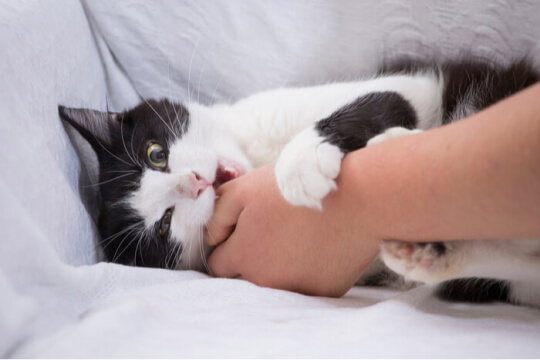
We beloved interacting and spending time with our cats whether through petting, belongings, playing or grooming, just what happens when our cat isn't in the mood, defensive or in pain, and bites us? In this commodity, we'll explore the answers to the question "why does my true cat seize with teeth me for no reason?" to better sympathize why cats bite and what to do when biting happens.
'Assailment' is serious and may lead to injury to people, and other pets, moreover zoonosis can transmit from cats to people through aggressive acts.
Understanding the cat's normal social behaviour, communication, facial expressions and feline emotions tin can forestall hostile behaviour towards carers.
Allow'due south explore why cats bite humans and how to tell if your cat gives yous 'love bites' or nips due to frustration or discomfort.
Understanding 'Assailment'
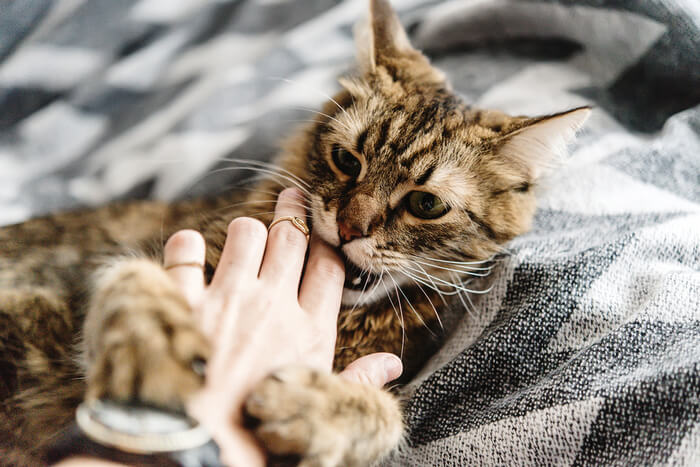
In lodge to empathise why your cat bites yous, you need to understand why cats exhibit aggressive behaviors in general.
Aggressive responses are related to innate behaviour of cats and a normal office of predation, play and social conflict which are all essential for survival of a territorial, independent, solitary hunter.
Assailment isn't a temperament trait or a diagnosis, information technology's a consequence of an emotional country.
While humans apply feelings to describe how they feel, cats' emotions are depicted every bit motivational-emotional systems, responsible for instinctual arousal instead of the feelings of emotion (Heath, 2018).
If a pet true cat starts displaying aggression towards humans, and then this represents a 'trouble behaviour' needing distinctive cess.
Assailment in cats is typically related to:
- Genetics and former experiences. Genetic differences in temperament volition impact how stressed a cat becomes in sure situations, how it reacts to a stressor, and the length of time a negative emotion lasts after the trigger has vanished. In addition to genetics, previous experiences play a function in individual'southward flexibility to adopt to alter.
- Lack of socialization. Mitt-raised kittens and adult cats that haven't been socialized with previous cats or handled by humans between 2 -fourteen weeks old tend to be more than nervous, fearful, aggressive with a reduced power to handle environmental alterations.
- Fear. Cats may react both offensively and defensively out of fear when they feel vulnerable, perceive a threat and imminent danger. The cat may respond in an ambitious manner past piercing if escape is unavoidable.
- Social conflict.Pet cats don't have command of who they live with or which cats or other pets they share their home with, it's evident some cats cope better with confinement and social living than others.
Reasons Why Cats Bite People
Cats may bite people for a multifariousness of reasons, including improper play habits in childhood, overstimulation, affection, and more.Hostility toward people is a common cat behaviour trouble. Categories include but aren't limited to:
i. Improper Kitten Play
Kittens who engage in rough fights during kittenhood are usually disrupted by mum if it becomes a touch vicious, teaching bite inhibition.
Social play includes wrestling, pouncing, piercing and episodes of play-fighting. Inadvertently, when humans attempt similar blazon games using their hands, reinforce its excitable behaviour encouraging kittens to abound into developed felines who pounce on easily and feet once they want play or attention.
2. Petting 'Aggression'
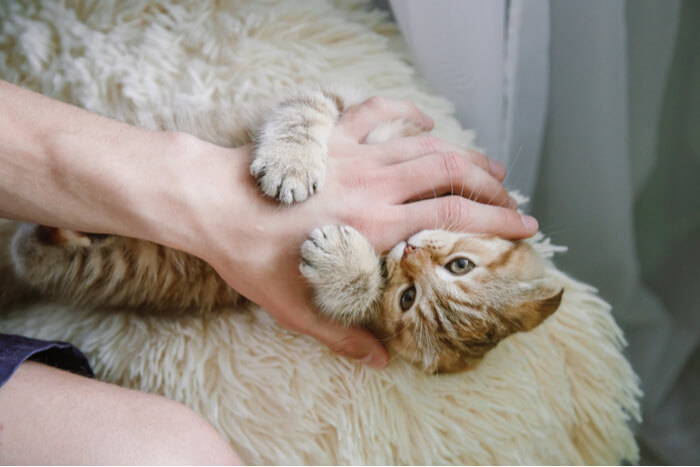
Cats volition occasionally bite when they're pet in a mode that is overstimulating or makes them feel vulnerable.
Petting-induced resentment happens when a cat solicits attention by being petted in part of their torso that creates him or her feel vulnerable (belly, chest or back), and so abruptly stops the interaction with clawing or stinging. Commonly, the true cat becomes overstimulated or agitated needing to stop the interaction.
Also Read: How To Pet A Cat – The 3 Bones Practise'southward And Don't's
Petting-induced belligerence is annoying and upsetting to pet owners. It'south commonly related to cats who become less tolerant of petting as they socially mature. You can avoid the attack with short petting sessions or by giving your cat attention in other means.
three. Redirected Frustration
If a cat is extremely aroused by an outdoor moggie or an issue, may redirect their hostility towards another pet or unsuspected nearby owner.
The stressful stimulus or the presence of the possessor will actuate the tension response leading towards an attack. Never try to handle your true cat during this aroused country since information technology can cause serious injury.
four. Medical and Painful Conditions
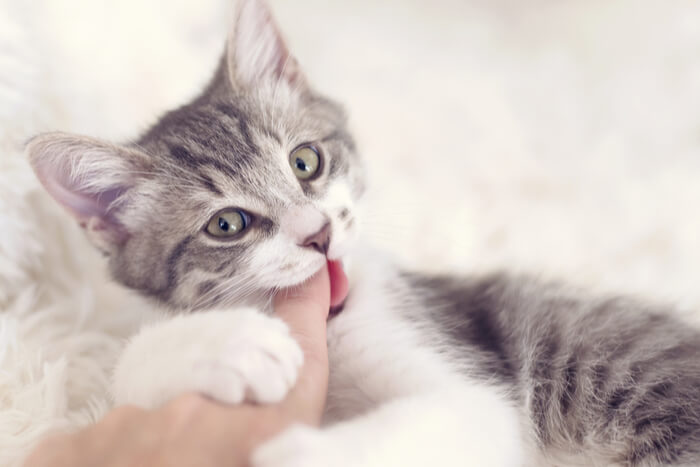
Cats will sometimes seize with teeth or exhibit other aggressive behaviors because they are in pain.
Confession time – my female cat has hurting associated assailment; it took me a long fourth dimension to work it out after multiple grips and vet visits. A cat who is ill or in hurting may assault their possessor (unintentionally) if approached or touched in an exceedingly vulnerable spot.
In my example, mild bear upon her arthritic hips or brushing her lower spine caused her to react with antagonism.
Both acute and chronic hurting can prompt tactile sensitivity and bitter. Painful conditions like dental disorders, Degenerative Joint Disease (DJD), meningioma, Intervertebral Disk Affliction (IVDD), FIC, wound or injury often induce a negative emotional state of anxiety and/or frustration and should prompt owners to seek immediate veterinary assistance.
What To Do If Your Cat Bites You?
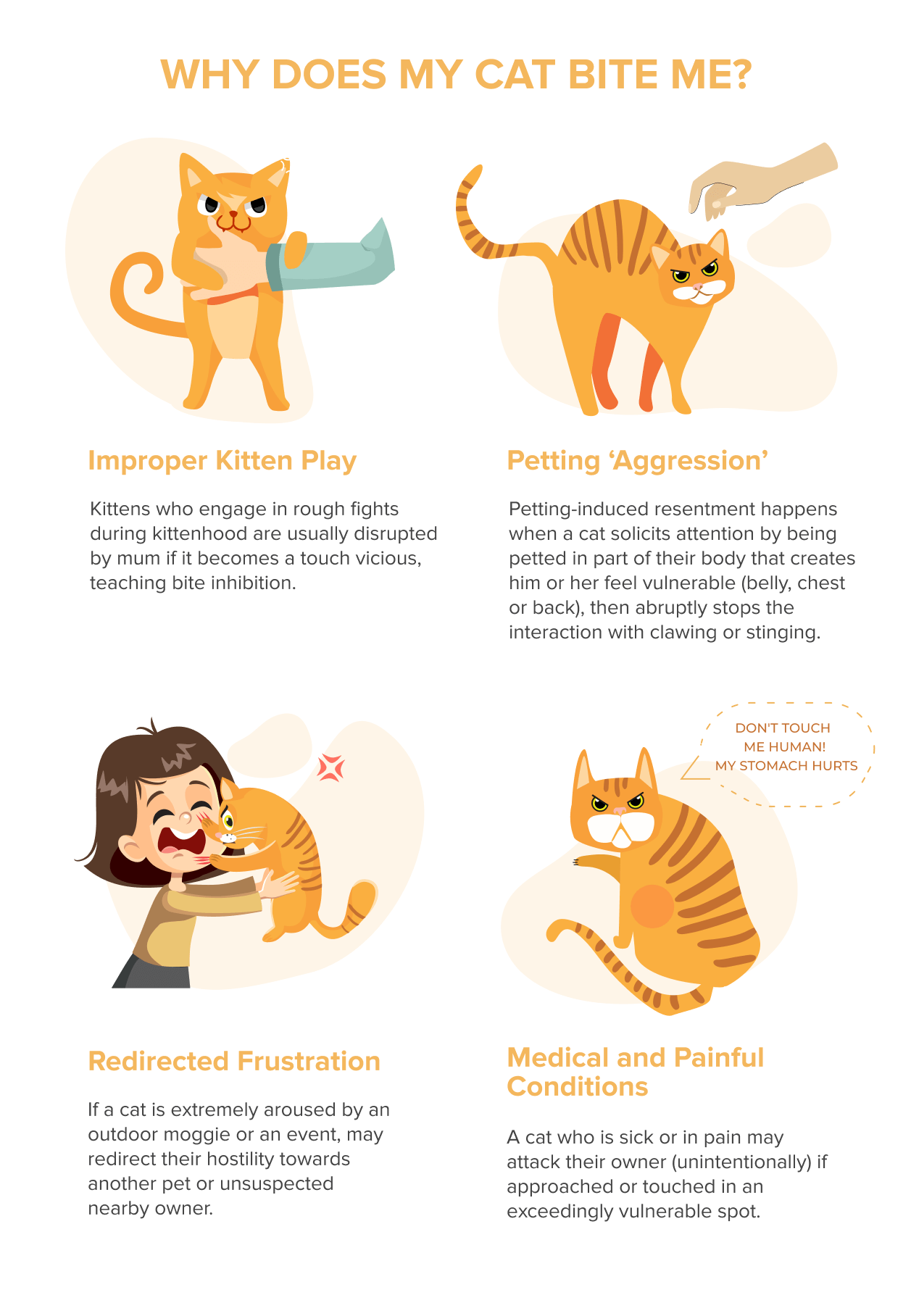
Rubber and prevention of further injury is paramount. Stop interacting with your cat and exit immediately.
Don't shout, bear on or punish your cat, especially if it'south in a highly aroused state (aggressive vocalization/body linguistic communication, behaving uncharacteristically).
If possible, divide the true cat from humans, children, and other pets in a different room with lights deemed off. One time the cat is rubber, treat all wounds plus seek medical communication instantly.
Ordinarily, cats calm downwardly inside a few hours. Terminate initiating any contact, allow your cat to decide on when to interact and for how long. This can crusade you to announced less intimidating and meddling.
A few days later, outset desensitization and counter-conditioning your cat gradually to bear upon and treatment, which should deepen the human-animal bond. If your cat demonstrates fearfulness or 'aggression' when touched, seek aid from a certified behaviour consultant or a veterinary behaviorist.
Lastly, take your true cat to the vet for an in-depth examination to dominion out an underlying medical reason.
How To Cease And Prevent Cat Biting?
Don't Allow Your Kitten Bite Your Hands Or Feet!
Kittens are super energetic and dearest playing. Avert luring your kitty to play past jiggling your fingers or toes, then get dismayed when he or she scratches or prick you. If your kitten attempts to crumb torso parts, look or step away earlier giving them attention.
Too Read: How To Accept Intendance Of A Kitten: The Consummate Guide
Always offer your moggie appropriate toys as a substitute, rotate games equally much as possible since cats like novelty objects.
Avoid stroking or picking the kitten during or subsequently playtime because it might unintentionally encourage the kitten to retrieve hands are toys. Hands are for loving – not for nipping!
If your kitten persistently nips, discourage him or her by bravado sharply but gently on the kitten's confront.
Betrayal young cats to gentle, positive torso handling to make sure they grow into adults who enjoy existence stroked.
Pay attending to areas your individual cats likes to exist stroked, only pet him or her where they're comfy.
Near cats adopt brusque sessions (seconds) of touch on parts of their body where scent glands are located such every bit the acme of their head, cheeks and chin. Certain cats similar quick, short strokes whilst others slower, longer strokes.
Watch out for alarm signs of agitation like tail swishing, piloerection, skin twitching, sudden vocalization, cat looking back at you and position shifting.
It'due south important our cats learn to cope with unavoidable events life throws at them. There could also be situations needing vet visits, grooming, medication or just meeting unannounced visitors. Socializing cats to a diversity of individuals and situations can preclude varieties of man-directed violence.
Use Redirection Training
Redirect undesired behaviour with clicker along with target preparation and advantage with treats or positive attention to encourage desired behaviour.
Environmental Adjustments Tin As well Help
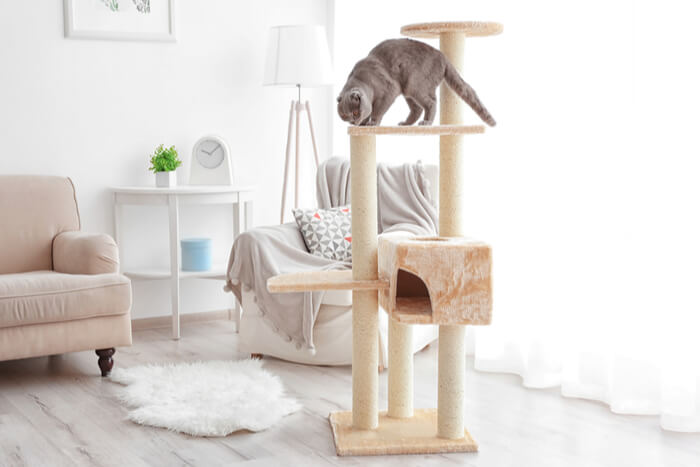
Providing an enriched environment—one with cat trees, shelves, and toys—can help to prevent biting and other forms of unwanted beliefs.
Set up an enriched environment to ameliorate physical activity, mental stimulation, decrease boredom, and prevent behaviour problems exhibited by under-stimulated cats.
Frustrated, angry indoor cats should be given outdoor access (ideally unrestricted) with numerous opportunities for climbing, exploration and problem-solving possibilities.
Here are a few means to enrich your cat's environment:
Increase Hiding and Perching Spots
Increase the number of hiding spots, high perching areas, and quiet areas (cat castles, boxes) to assist your cat feel comfortable and reduce competition in multi-cat homes. Viewing platforms volition allow your true cat to accustom to new places, noises, and experiences without the necessity to retreat.
Minimise Ecology Changes
Continue the house environs predictable with a sense of security. Regular and gradual environmental changes tin can aid to continue your cat from startling easily. If you must make a sudden environmental alter, try pheromone products to help the reduction of fearfulness-based aggression.
Provide Food Puzzles and Predatory Games
Use food puzzles to resolve situations where the true cat experiences frustration, when food isn't easily obtainable or equally a natural concept for hunting behaviour.
Ensure your cat has an appropriate outlet for hunting games each day. Avoid frustration-provoking play with laser pointers only.
Predation of hands and feet won't occur in one case your cat has an opportunity for stalking games with toys like Hartz Merely For Cats Kitty Pulley Cat Wand Toy, Cat Dancer, and SmartyKatSkitter Critters Cat Toy. Follow play sessions with treats to cease the hunting sequence.
Conclusion

If possible, preventing cat biting should begin in kittenhood. Avoid letting your kitten play with or bite your hands and feet.
Residing in a domestic environment puts considerable pressure on pet cats. Enhancing their physical and social environment is each owner's responsibleness.
Cases involving human being-directed 'aggression' are often tackled using a large selection of interventions. In some instances, behaviour modification and medication can also help.
Frequently Asked Questions
Why does my true cat bite me when he's existence appreciating?
Certain cats may give yous 'love bites' every bit an indication of amore. Little nibbles in the blazon of tiny, caring frail gestures adopted from kittenhood playfulness converted into machismo. Pleasurable with no hurting or hostility.
What should you practice if your cat bites you?
Cease firsthand interaction with your true cat and leave the room. True cat bites require medical attention, wound cleaning and possible class of antibiotics including veterinary check-up.
Why practice cats bite their owners for no reason?
Cats don't bite with no reason. Pain, disease, stress and changes inside the true cat's physical or social environment tin can all manifest through behavioural changes. Cats communicate by attempting to shield themselves and end interaction. Owners must learn to recognise signs of distress displayed through body language then try identifying the underlying reason for the behaviour.
View Sources
Ellis, S. (2020, January). Understanding and recognising fright, anxiety and frustration. Feline Focus. (I. C. Care, Compiler) Tisbury, Wiltshire, UK. Retrieved December 08, 2020
Halls, Five. (2020). I'one thousand smashing, I only exercise bad things!': Reframing our thoughts on aggressive cats. International Society of Feline Medicine Symposium (pp. 1-7). UK: ISFM. Retrieved Dec 18, 2020
Heath, I. R. (2016). Feline Behavioral Health and Welfare. St Louis, MO: Elsevier. Pg 73-77, 232-238, 376-382. Retrieved December xv, 2020
Heath, S. (2018). Understanding Feline Emotions and their role in problem behaviours. Journal of Feline Medicine and Surgery, 20, 437-444. Retrieved December 10, 2020
Helen Tuzio, T. E. (2004). FELINE Behavior GUIDELINES. (A. A. Practitioners, Compiler) USA: AAFP. Retrieved December 08, 2020
Miller, P. G. (2020, December 07). Training Cats. Barks from the Guild. (B. Magazine, Compiler) Us.
Rodan, D. F. (2018). Behavioral Awareness in the Feline Consultation - Agreement physical and emotional health. Journal of Feline Medicine and Surgery, 20, 423-436. Retrieved December 12, 2020
Stanslaski, J. (2020). Why does my cat - Curious and odd behaviours of our feline companions. International Club of Feline Medicine Symposium (pp. ix-xiii). ISFM. Retrieved December 12, 2020
Source: https://allaboutcats.com/why-does-my-cat-bite-me
Posted by: kennedymiltrared1985.blogspot.com

0 Response to "Why Aren't All Cameras Full Frame?"
Post a Comment